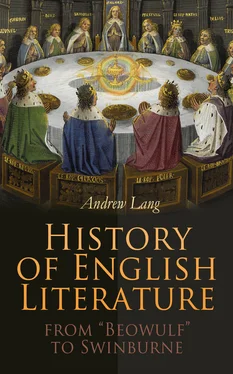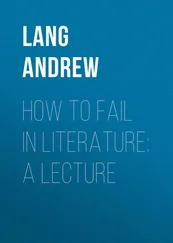1 ...6 7 8 10 11 12 ...40 The numerous books which were within the reach of Bede were brought, in five journeys, by Benedict Biscop, Abbot of Wearmouth, from Rome to Northumberland. Before Bede, such books had been studied by Aldhelm (Bishop of Sherborne, died 709). He wrote poetry in the native language, which King Alfred greatly admired, but none of the extant poems are attributed to him. His Latin would have surprised Cicero; he delighted in strange words, and in strings of alliterations. He wrote edifying treatises on Christian virtues as exemplified by Biblical characters and by saints, some of them rather fabulous personages. He knew many early Christian authors, and Virgil, Cicero, Ovid, and Lucan, but his own style was as absurdly bombastic as that of many of the ancient Irish romances. He had disciples in style, who manufactured acrostics in Latin verse.
The Latin literature of the southern Anglo-Saxons thus fell for a time into full decadence; very different was the learning of the northern Bede. His taste was uncorrupted by the sudden arrival of ancient literature among a people almost barbarous. He wrote in plain Latin without affectation concerning things worthy to be known and remembered: he gave us a frank and charming picture of the great St. Cuthbert; he had, no doubt, too great a love of miracles, and rather exaggerated some which he found in earlier lives of early English saints, such as the said Cuthbert, the saint of the Border, whose body sleeps in Durham Cathedral. The authors whom he quotes are mainly Christian, including many of the chief Fathers of the Church, and he is not certain about the propriety of studying the heathen classics, though he cannot abstain from Virgil, who, it was fancied, predicted the coming of Christ. He had Greek enough to read the Greek New Testament, but this learning was lost, in England, in later times. The translation of Bede's "History" into Anglo-Saxon under King Alfred was not the least of his gifts to his people.
Alcuin (735-804), a pupil of the school of York, lived at the worst period of the savage attacks made by the still heathen Danes on England. What the Anglo-Saxons had done to the Britons, the Danes after 780 did to the Anglo-Saxons, slaying, plundering, torturing, and burning, wherever they came. Happily for Alcuin he passed most of his life abroad, aiding the great Emperor Charlemagne in founding schools and fostering education. Charlemagne collected the old war-songs of his people, little dreaming that in three centuries he would become as fabulous a hero, in the French epic poems of the eleventh to the thirteenth century, as Beowulf or Alboin had been in Germanic lays. Alcuin had far more influence as a lecturer and as a writer of letters than as an author; in a poem he preserves the names of the books in the libraries of York and Wearmouth, beautiful manuscripts that would now be almost priceless, but the Danes burned them all. Other Latin writers there were, they mainly dealt with religious themes, and their works are of very little importance.
Not till the kingdom of the West Saxons, Wessex, became the most powerful state in England, and made successful resistance to the Scandinavian invaders, who had destroyed monasteries everywhere, were learning and literature able to raise their heads again. It was the most famous of English kings, Alfred (849-901), that, among all his other labours as warrior and ruler, restored education.
It is unfortunate that so many matters of interest in Anglo-Saxon times are veiled in obscurity. The "Life of Alfred," by Asser, a Welshman, Bishop of Sherborne, is a confused record.
Alfred was certainly taken to Rome by his father at a very early age, but all that is told on this subject is most perplexing. He is said to have been untaught in the art of reading till he was 12 years old, but he heard Anglo-Saxon poems repeated by others, and knew many of them by heart. The famous tale that his mother offered a book of Anglo-Saxon poems to the first of her sons who should "learn it," and that Alfred was taken by the beauty of the illuminations, learned to read, and won the prize, is absolutely unintelligible in Asser's Latin. But Asser says, and Alfred, in his Preface to an Anglo-Saxon translation of Pope Gregory's "Pastoral Care" himself avers, that learning was almost or quite extinct south of the Humber, when his reign began, while in Northumbria matters were little better. But his father's second wife, Judith, was daughter to the Emperor, Charles the Bald, and though Judith, a young girl, was far from being sedate and erudite, the connexion with the Continent enabled Alfred to bring over Frankish scholars, such as Grimbald, while from Wales came Asser, who, for part of each year, lived with Alfred as his tutor.
The king wrote a Handbook, or commonplace book, of Latin extracts, which he translated into his own native tongue; and later he translated, or caused to be translated, the "Pastoral Care" of Pope Gregory; the very popular work on "Consolation" by Boëthius, a philosopher who was slain about 524; the "Church History" of Bede; and a kind of "History of the World" by Orosius, a Christian writer of the fifth century. Of these books, the "History" by Bede was of the greatest value for Englishmen; the "Consolations" of Boëthius are at least as consolatory as any others, and were long popular; while whoever reads Orosius will learn many things, though he will learn them wrong, about the whole history of the human race. Still, the Anglo-Saxon reader became aware of the elements of geography, and of the existence of the powers of ancient Assyria, Egypt, Crete, and Athens, while much space is devoted to the empire of the Amazons. 1"It is shameful," says Orosius, nobly, "to speak of such a state of things, when such miserable women, and so foreign , had subdued the bravest men of all this earth," a conquest which the women repeated, he says, during the Peloponnesian war!
When Orosius reaches Roman history he is much more copious, and not so amusingly incorrect. Alfred, as a rule, paraphrased rather than translated his originals, omitting and adding at pleasure, and amplifying the geography of the North, by information received through Otthere and Wulfstan, contemporary voyagers.
He found learning on its deathbed and he restored and revived it, saving erudition from the natural contempt of men by the royal example of a great statesman, sportsman, and warrior. It was plain to the world that, in spite of the human tendency to despise books, learning was not merely an affair for shavelings in cloisters, for the great king himself loved reading and writing.
The Anglo-Saxon Chronicle.
To the influence of Alfred is attributed, with much probability, the organization of the earlier parts of the "Anglo-Saxon Chronicle," which briefly tells the history of the country from year to year. There were several versions of these annals, containing the most notable events of each year. It seems that copies of one manuscript, containing the remotest events, beginning with the invasion of Britain by Julius Cæsar, and going on to Alfred's own age, were given to several monasteries. In each the scribe afterwards continued to make, as it were, a diary of the chief occurrences, and, later, various additions about past events would be inserted in various religious houses, so that the dates are not always to be trusted. After the year of Alfred's birth, the records become more full. In his "Life of Alfred," Asser turned much of the "Chronicle" for Alfred's reign into Latin: the materials of the "Chronicle," therefore, existed in his day (an early part of it was by a Northumbrian writer). The "Chronicle" now exists in several versions, done by various hands in various monasteries. Some "Chronicles" are lost, such as that of Kent, whence much matter has been borrowed by that of Peterborough, which is the longest, and reaches the year 1154.
Читать дальше












